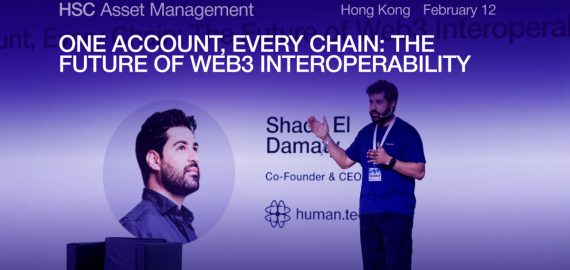Fireblocks’ Amy Zhang Talks Blockchain, AI and the Metaverse at Hong Kong Web3 Festival 2023


A seasoned leader with over a decade of experience in the TradFi industry, Amy Zhang made a pivot to web3 in 2020 when she took on the role of Vice President of Sales, APAC at Fireblocks, a digital asset custody and transfer technology provider.
Fireblocks has achieved remarkable success, having already facilitated over $4 trillion in transfers of digital assets since launching out of stealth mode in 2019. Throughout last year, Fireblock’s impressive performance has attracted more than 1,800 institutional customers worldwide to onboard the platform. In addition, the platform’s 2022 performance exceeded that of 2021, demonstrating its growth in the market despite challenging market conditions.
On the ground at Hong Kong Web3 Festival 2023, Metaverse Post CEO Danil Myakin catches up with Zhang after her panel to discuss the crypto market, the metaverse, and how AI can play a part in blockchain.
Please introduce yourself and tell us a bit more about what Fireblocks does. It’s a huge company with tons of employees, tons of products, and great funding, but not everybody in this space understands the crucial role Fireblocks plays in the industry.
My name is Amy, and I run sales at Fireblocks in the APAC region. I think one of the biggest misconceptions people have is that Fireblocks is a custodian. We are a technology provider for over 1,800 customers, and all of our customers use our technology to manage their digital assets within their own control.
How we do that is we use something called multi-party computation (MPC), which allows you to manage your keys in a very secure way. We did that for the first two groups of customers in Asia when we opened our headquarters in Singapore in 2020, and that’s your liquidity makers, funds, asset managers and exchanges, and retail platforms. That’s kind of what people know us for.
From there, you’ve got what we call the Fireblocks Network, which brings me to the second misconception that a lot of people have of us. We are not a blockchain; we’re not a layer-2 solution. The Fireblocks Network is effectively an unchained address book where when our customers like Galaxy want to send money to GSR, they don’t have to store all of the deposit addresses for all the assets that they trade with each other on; they simply connect to each other via the Fireblocks Network. And we will help to manage and store the addresses to create the transactions and then subsequently help them to sign the transaction on-chain.
We also enable them to connect to various sets of exchanges and banks to allow them to initiate deposits and withdrawals to and from these exchanges. And that kind of summarizes what most people know of Fireblocks today. I would say one of the other three segments we spend a lot of our time on is the banks. We work with the Bank of New York Mellon (BNY Mellon) to support them with their custody use case, for example. Let’s say they want to offer crypto custody to their end clients; they will use Fireblocks to do that. And most recently, banks want to issue sets of stablecoins, and they will use us and our tokenization tool to help them create these assets in a controlled manner.
I will say one of the last two pieces of the puzzle is our payment solution. We work with PSPs to allow them to do pay-in and pay-out use cases. And finally, we also power web3 use cases. So we have a whole suite of solutions to allow folks to deal with NFTs, noncustodial wallets, and more. All that makes up the Fireblocks product suite.
We have around 600 employees globally now, with the majority of our folks based in Tel Aviv, where our R&D center and our product development team are located, and the rest across the globe in Singapore, Hong Kong, New York, and London.
As you said, Fireblocks is mainly a technological company. And lately, I’ve been hearing a lot about account abstraction, and that’s one of the main drivers for the future mass adoption of crypto. What can you tell us about this?
So account abstraction is a very interesting challenge if you attack it from just the reserve perspective. With Fireblocks, you can already see that information right when you open up a workspace. You click on a vault, and in that vault, you have crypto in it. When you look the address up on the blockchain, you can see everything on there already.
So one aspect of account abstraction in terms of splitting from omnibuses, adding transactions, and managing all these nuances, I think we could do today already. And the second part is around liabilities, which we’re exploring with our customers at the moment to see how you can use wallets to manage those nuances, but at the moment, we don’t have a product to solve that yet.
You mentioned a lot of clients that a lot of big guys work with you as liquidity providers, and readers will be looking for some market insights. With the recent price movements of Bitcoin and Ethereum, what’s your take on how long this run will last and what caused it?
Wow, that’s a really tough question because I’m not a trader myself. I could give you some opinions, but if I’m wrong, please don’t call me out on it. I think what’s interesting about the recent bull run that we’ve experienced is that it’s still very macro-driven. It’s very much about what the Fed is going to do in terms of rate hikes, how they’re gonna manage the nuances. And subsequently, if you look at some of the activity that’s happening with at least the main coins like Bitcoin, it is very macro-related, and that, I think, will continue to be the main driver.
From a technical perspective, $30k is a real psychological barrier? Whether we stay here, go up, or go down, I don’t know. But I do think that if we look at the current environment that we’re in, it’s very much based on a risk-on mentality, and crypto, ultimately, is still a risk-on asset. I don’t think that’s why the market went up. I think the reason why is that nobody had access to banks, and they needed to buy something and move on to stablecoins, but the argument could be made that folks are looking at Bitcoin as a real reserve currency, which could lead to more adoption in this space and drive a lot of the capital inflows into this market.
Since the crypto-friendly banks are no longer here, it’s actually more difficult for new institutional money as well as new retail money to come in. I think that will be the negative side to what we’ll see happen in the next three to six months, which is this mentality of fresh capital coming in and how it will come in. Does the general populace believe in digital assets for the long term, given we’re still in the shadows of post-FTX, post-Silvergate?
The market is also really illiquid at the moment. You don’t feel like you’re missing out on stuff, so you’re less likely to put money in now. And I think that is the downside driver at the moment as well. You could speculate that more banks will go under, given what’s going on in the macro environment. So I think a lot of institutional investors as well as a lot of retail folks, are quite cautious at the moment.
We’re interviewing you for the Metaverse Post. I’m curious what’s your take on the metaverse? How do you define it for yourself?
I’m a big gamer. From my perspective, the metaverse is less about the Ready Player One experience; to me, the metaverse is a really visual representation of our data that currently sits in strings of code stored in Facebook or Google databases. And the users have no way of representing it, no way to access it.
The fundamental piece of the metaverse is the diverse representation of our online presence. That could easily be in the form of your profile on a social media platform. You could then subsequently have actual characters that represent your real life in a virtual environment. There are definitely a lot of elements of decentralization and using blockchain as a foundation, but I will always highlight that it’s been a race at the moment between the web3 movements, and the technology with real-time rendering and edge computing and all the others that are coming out of the metaverse. To me, it comes down to what is a hot topic and where it is getting funding from.
Despite huge evolution around real-time rendering, AI, and all these nuances, I don’t think the end user is at the point where they care so much about data privacy and data control that they’re demanding the platforms do it. But then again, you look at what’s happened in Europe, like what’s going on with the GDPR ruling and even the ruling around Apple not giving advertisement data to social media platforms. I think we will also move in that direction as well.
So to me, the metaverse is a combination of all those things. How it will actualize today is really theoretical. It will depend upon so many other technology developments that are beyond our own world of blockchain. And it is important to take a step back and think about what it is today.
Today, the metaverse, to me, is really around engagement loyalty points. It’s how you build a way to engage the audience. Very web3 and NFT-driven loyalty projects are already live and active. That’s the basis of the metaverse today. There’s no ecosystem yet. And I think a lot of folks have spent a lot of time on it. I think a lot of video rendering technology could really change the way we think about that experience.
The metaverse right now is really freaky. It’s ugly and boring most of the time, and many things that are fun aren’t seen as part of it for some reason. To them, they’re games. People can spend hours and hours playing on their laptops.
What about AI? You just mentioned that it can influence the development of the metaverse. So what’s your take, especially on the crypto AI side? You may have seen a bunch of projects pop up because they had ‘AI’ in their name, but what do you think about this trend?
It’s actually really interesting because if you look at the actual development of AI companies, there are actually three or four big ones working on AI stuff, and they actually buy out all the competition. There’s no such thing as a startup AI solution that is scalable because they’ve been bought out by Microsoft, Google, and Meta. So the real applications that have been built on the back of AI have been driven by these big tech companies.
What I see in crypto AI products is more about the applications on top. They will take AI algorithms or whatever you want to call the actual tooling and lay both sets of use cases on top that could automate a lot of the day-to-day use cases. That’s kind of where I think crypto AI really is. We combined these two buzzwords. I feel like it’s mostly crypto use cases. The Googles and Metas of the world are building the real AI stuff happening there. So that’s kind of how I view that happening.
Now, I do also think what AI could do is, if you look at what’s interesting about the crypto industry, it’s all the small companies bootstrapping ideas. Access to funding, that’s easy. And that combined with automation using AI could just double or exponentially increase the ability for these bootstrapped companies to really grow and scale. I think that could be really exciting for the industry as well. I use ChatGPT every day, and it’s really interesting to think about the skills I will have to improve in my day-to-day interactions now that there are all these application layer AI tools that are so readily available for a lot of folks.
Interestingly, you pointed out that in reality, three companies basically own AI. And there’s a statement that AI is available to everyone, but it can be prohibitively expensive to build your own AI startup. We tried using cloud providers to host self-hosted LLMs, but eventually pivoted back to just using GPT4.
It’s good and bad, right? Good, meaning you know what your exit is. So if you’re a startup, you have some IP. Whether you’ve got a bunch of people with PhDs working on some algorithm or you’re building some optimization layer that allows you to really scale out the data processing, there are so many elements in the AI industry. Whether it’s data cleaning or data absorption, you know where your exit’s going to be because if you do a really great job, one of them will buy you.
But to your point: Is that readily available as access for good? And that’s an age-old debate for any technology. Are all these toolings only available for the wealthy? Can we actually make it democratized enough for the Average Joe? That’s the same problem with even blockchain. We talked about how blockchain in theory could really improve the unbanked problem. But the reality is who’s going to actually have the funding to go knock on a village door to bank these people on their mobile phones? It’s a really challenging topic that I think a lot of folks are trying to solve.
Where I see interest now is where a lot of governments are taking a proactive initiative in solving these problems. Let’s use money as an example: Many governments of emerging countries know that their population that works abroad are paying tons of money for cross-border transfers. So the government will try to proactively build solutions to help the population get better access to finance. And I think that will probably be the case for a lot of AI tooling as well, where governments in general will try to develop applications that are more widely utilized. That could be a great way to reduce some of the high costs that come with being involved in this space.
Another example would be in Hong Kong. Let’s say you want to go to Cyberport, and the government will fund you to open up businesses there. So the government is proactively trying to help startups who may not have the funding to get access to really expensive AI tooling, but the government will come in and help you pay some of the bills that allow you to grow your business. These types of initiatives will help the industry and local startups compete in that space.
We’re in Hong Kong today. Are you based in Hong Kong. If not, why not? If yes, why? What’s your take on the recent regulatory changes? Is Hong Kong the next crypto hub for the people in China?
I’ll answer the second question first, then I’ll go back to my current personal situation. I think the current development of Hong Kong is super exciting because the regulator has given very clear directions to the operators and enabled them to service retail clients. Knowing the fiat inflows between China and Hong Kong is much more open.
You can speculate why they’re doing this. In the same way, Macau is the hub for gambling in this region. Hong Kong could be that hub where they experiment with regulating retail access, either using that as a hub down the road or later opening up China for digital asset activities. Trading is the key thing here. But also, China has already been very progressive around NFT platforms and tokenization. So that direction is definitely where I think Hong Kong is going.
We are going to have to see how many changes apply from June 1, including requirements on insurance. Right now, what’s currently written in the constitution paper is 100% insurance requirements. It’s quite cumbersome and really prohibitive for businesses to operate. So if they change that, maybe you can see what the axis looks like. By then, you could decide if Hong Kong is going to be the next big hub or not.
I’ve been based in Hong Kong for the last eight years. I live here, but I’m moving to Singapore soon, which isn’t related to my lack of conviction in Hong Kong. In fact, I think Hong Kong is a beautiful place to live, and I love my lifestyle here. For me, it’s actually a very personal one.
Fireblocks is in APAC, we have 60 people. And we have 50 of those 60 based in Singapore. So as we move away from COVID, I want to be able to help my team more effectively by being in the trenches with them. It just makes more sense for me to be in Singapore for a little while. I also recognize that Hong Kong is creating a lot of excitement. So maybe we will rebalance the teams and figure out some nuances thereafter, but I don’t want to say my personal move is an indication of my belief in what Hong Kong could be like. It just means I’ll be flying back and forth a lot more than I had initially planned now that so much is happening here.
Any closing thoughts or things you want to share?
No, I’m super excited. You know, before we started chatting, when you guys reached out, I’d never read anything MPost has produced before. Now I’m very, very keen to follow up more because you guys are really covering a lot of exciting topics, and I’m looking forward to seeing what gets published.
Read more:
Disclaimer
In line with the Trust Project guidelines, please note that the information provided on this page is not intended to be and should not be interpreted as legal, tax, investment, financial, or any other form of advice. It is important to only invest what you can afford to lose and to seek independent financial advice if you have any doubts. For further information, we suggest referring to the terms and conditions as well as the help and support pages provided by the issuer or advertiser. MetaversePost is committed to accurate, unbiased reporting, but market conditions are subject to change without notice.
About The Author
Serial crypto entrepreneur, VC fund partner, and CEO of the Metaverse Post.
More articles

Serial crypto entrepreneur, VC fund partner, and CEO of the Metaverse Post.



















































